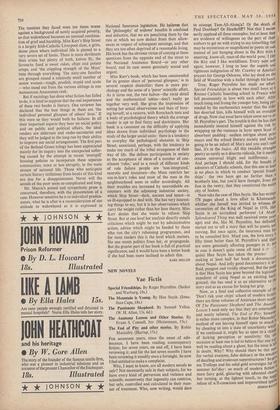Ways of Life Widows and their Families. By Peter Marris.
(Routledge and Kegan Paul, 18s.) The People of Ship Street. By Madeline Kerr. (Routledge and Kegan Paul, 23s.) THERE is a feeling that we have done away with the poor by passing certain laws. To an astonish- ing extent, however, they have remained fixed in a secret and separate way of life, like the gypsies or the Guards. The Welfare State is only the latest in a string of national changes none of which has touched them really deeply. It is astonishing, too, the extent to which they have been ignored in the country's literature. An American novelist like Saul Bellow writes from an intimacy with work- ing-class experience and is surrounded by similar writing, while almost all we have to offer is Orwell, spying affectionately on the poor from a very special vantage-point.
This is darkest Britain and now, stealing a fair amount of literary thunder, the anthropologists are exploring it. The present books are a further survey of the areas where it is still hard to make ends meet and where the wash-house and the pawnshop are regular features of the neighbour- hood. Peter Marris has completed the Bethnal Green trilogy begun by Michael Young and Peter Townsend, and has studied the effects of bereave- ment on the lives of seventy-two East End widows. The tensions they faced were ten times worse against a background of newly acquired poverty, so that widowhood becomes an unusual combina- tion of grief and hardship. Miss Kerr's Ship Street is a largely Irish-Catholic Liverpool slum, a grim, dense place where individual life is pinned to a very severe set of limits. There is more devilment than crime but plenty of both, knives fly, the favourite food is sweet cakes, chips and potato crisps, and 'the crippling strength of the Mum' runs through everything. The sixty-one families are grouped round a relatively small number of senior women—tough, prudish, stupid and acute —who stand out from the various siblings in one momentous Amazonian rank.
But if sociology has done what fiction has failed to do, it is fatal to suppose that the real importance of these two books is literary. One reviewer has declared that the best things in them are 'the individual personal glimpses of others' lives.' If this were so they would both be failures. In all their important aspects they bear on social policy and on public and political affairs, the ideal readers are aldermen and under-secretaries and they will be judged in the long run by their ability to improve our social arrangements. The first part of the Bethnal Green trilogy has been appreciated mainly for its inquiry into the unexpected suffer- ing caused by the attempt in recent 'overspill' housing policies to incorporate these separate communities, more or less abruptly, in the main stream of national life. Those who anticipate certain literary titillations from books of this kind are due for a disappointment. Never will the annals of the poor seem so complicated and long.
• Mr. Marris's poised and sympathetic prose is concerned, therefore, with the presentation of a case. However sensitive he is to individual predica- ments, what he is after is a reconsideration of our attitude to widowhood as it is expressed in National Insurance legislation. He believes that the 'philosophy' of widows' benefits is confused and defective, that we are penalising them by the rate at which we now deduct from their allow- ances in respect of subsequent earnings, and that they are too often deprived of a reasonable living. His book has the obvious virtue of coming at these questions from the opposite end of the street to the National Assistance Board—or any other board, and its case seems genuinely sound and urgent.
Miss Kerr's book, which has been commended for its greater share of 'personal glimpses,' is in several respects dissimilar; there is more psy- chology and the sense of a 'purer' scientific effort. As it turns out, the two halves—the vivid detail and the mathematical tables—don't really go together very well. She gives the impression of noting her actual observations and then of busy- ing herself, at a remove, with Rorschach tests and a body of psychological theory which the average reader is apt to find fuzzy and doctrinaire. Her book is a comment on the difficulty of applying ideas drawn from individual psychology to the study of the larger social units : there is a tendency to overplay the pathological elements in Ship Street, associated, perhaps, with the tendency to make too much of the tribal strangeness of their way of life. She defines participation in society as the acceptance of some of a number of con- stituent 'roles,' and as a result of different kinds of role failure people are 'non-integrated,' neurotic and immature—the Mum restricts her son-in-law's roles and most of the men in the neighbourhood seem to suffer accordingly. All their troubles are increased by unavoidable en- counters with the adjoining industrial society, which Ship Street—dark, ancient and intact—is so ill-equipped to deal with. She has very interest- ing things to say, but it is her observations which carry the weight rather than her later theory, Miss Kerr denies that she wants to reform Ship Street. But at one level her analysis directly entails criticisms which might be met by administrative action, advice which might be heeded by those who run the city's rehousing programmes, and for most readers this is the level which matters. No one wants politics from her, or propaganda. But the greater part of her book is full of practical significance, and it would have been a better book if she had been more inclined to admit this.
KARL MILLER













































 Previous page
Previous page